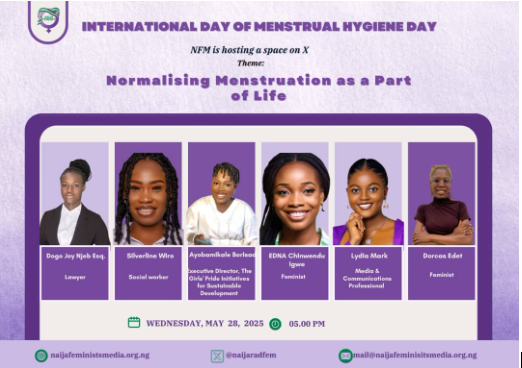
|
Getting your Trinity Audio player ready...
|
Apostle Femi Lazarus, founder of the Sphere of Light Church, is known for his sermons and influence among young Christians across Nigeria. Recently, one of his messages stirred controversy. In a viral clip on TikTok, he seemed to suggest that women often hide behind their menstrual moods to justify anger or bad behaviour, saying, in essence, that women are not always peaceful.
For many women, those words hit a nerve. Because they echo something deeper, a long history of how society misunderstands and misrepresents women’s bodies. However, peace herein is gender biased, as he insinuates in his teachings that peace in a home is dependent on a woman, not on the man.
In simple terms, according to Medline Plus, Menstruation, or period, is normal vaginal bleeding that occurs as part of a woman’s monthly cycle. It’s the body’s way of preparing for a possible pregnancy. Menstruation is not a weakness, and it is not associated with character. It’s biology.
During a woman’s monthly cycle, hormones such as estrogen and progesterone fluctuate, affecting energy, mood, and even pain levels. This period is referred to as the Luteal Phase from Days 15–28, after ovulation, progesterone rises to prepare the uterus for a possible pregnancy. If pregnancy doesn’t happen, progesterone drops, leading to symptoms like bloating, irritability, mood swings, or sadness.
These changes are known as PMS (Premenstrual Syndrome) and are normal hormonal fluctuations, not signs of bad character or instability. These shifts can cause discomfort, fatigue, and emotional sensitivity, all of which are perfectly normal physiological responses, not reflections of moral failure.
To call women unpeaceful because of what their bodies naturally go through is not just unfair; it’s dismissive. It ignores the fact that millions of women still go to work, care for families, lead organisations, and show up for life even in pain. What’s truly remarkable isn’t that women experience hormonal changes, but rather that they continue to show up through them.
This moment isn’t just about one preacher’s words; it is about the need for more empathy and education around women’s health. When people with influence speak about topics like menstruation, their words can either reinforce stigma or break it.
The truth is, women don’t need to be fixed for being human. Hormones don’t make women difficult; they make them human beings with complex, powerful bodies.
Many cultural and religious misconceptions frame menstruation as a sign of emotional imbalance, instead of a natural rhythm of life. Understanding it helps society replace shame with empathy and misinformation with truth.
Therefore, instead of advising women to be more peaceful, society should try to be more considerate. Because every time a woman is misunderstood for her biology, we all lose an opportunity to build a world rooted in compassion and honesty.
Experts weigh in
In reaction to this misleading misconception, a gender advocate and journalist, Aisha Sarduna, urged influential leaders to be factual with their statements, saying,
“Such claims paint women as irrational or overly emotional, which undermines the efforts of gender equality and menstrual dignity.”
She suggests that media literacy on menstrual health to reduce stigma should be normalised.
Similarly, another expert, Dr Amaka Nzeako, a reproductive health specialist, highlighted that menstruation is a natural process, not a character deformity. Hormonal changes affect mood and energy, but don’t define a woman’s worth. She emphasised that religious leaders should be educated to promote accurate information and avoid shaming women for biology.
She further adds that faith-based platforms should integrate accurate health education into their teachings!






